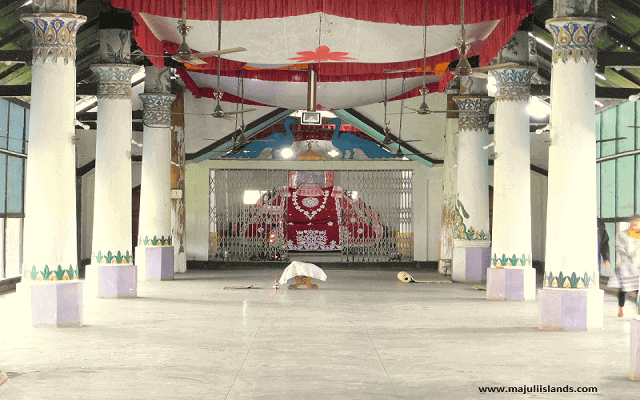Satra-The Cultural And Religious Institute Of The Majuli Island | The Cultural & Religious Institutions Of Majuli
 |
| Sri Sri Auniati Satra Of The Majuli Island |
Satra-The Cultural And Religious Institute Of The Majuli Island | The Cultural & Religious Institutions Of Majuli
The Satra is the non-secular and cultural establishment of the Majuli Island. The Satra is bothered by the principles and pious practices of Neo-Vaishnavism. Neo-Vaishnavism may be a social movement that has had a strong impact on the socio-cultural and non-secular lifetime of the various community individuals of the Majuli Island. Mainly the Satras are situated on the Majuli Island that is termed cultural or non-secular hub of Province. The first focus of the Satra is to enlighten individuals through cultural, non-secular and religious practices. The Satra is additionally known as the centre of cultural activities. It provides the associate in the uncommon cultural identity of the Majuli Island. The Satra is the physical place of spiritual, cultural and non-secular beliefs of Neo-Vaishnavism. The art, dance music, songs and all other cultural activities are an integral part of the Satra of Majuli Island. The Satra can connect the common people of the Majuli Island through their culture and teach the principle of religion and socio-cultural life. The culture of the Satra has been playing an important role in binding together different community people of the Majuli Island. The Satriya culture binds the different community people of the Majuli Island through the spread of different religious culture and ideologies of the Neo-Vaishnavism. Now there are 22 Satras are present in the Majuli Island. Four of them are main Satras of the Majuli Island.
Satra-The Cultural And Religious Institute Of The Majuli Island | The Cultural & Religious Institutions Of Majuli
 |
| Monikut(Thapona) Of The Sri Sri Uttar Kamalabari Satra |
The social management system of the Satra is managed by two categories folks or devotees- one is termed the Satradhikara and another is termed Bhakats. The Satradhikar is the religious and administrative body head of the Satra and the Bhakats are the devotees of the Satra who stays permanently inside the Satra. The Satradhikar is chargeable for the executive activities and also the Bhakats are chargeable for distinct reasonably non-secular, cultural and social activities. There are two classes of Bhakats are present in the Satra depends on the scale and specific functions of the Satra that are called-Grihasti and Udasin.
Also Read: Festivals Celebrated In The River Island Majuli
Search Disclaimer:
Search Disclaimer:
- Satras Of Majuli
- What Is Satra
- Religious Institutes Of Majuli
- Cultural Institutes Of Majuli



Post a Comment
0Comments